新视野大学英语读写教程2——课文翻译
新视野大学英语读写教程2-(第三版)-unit-2-课文原文及翻译
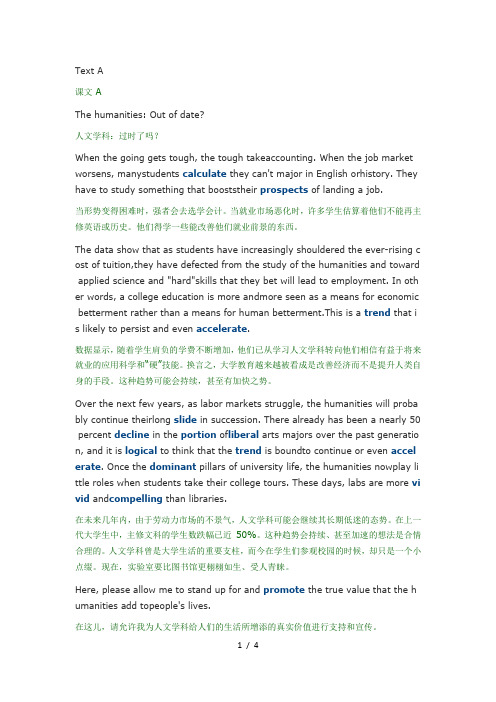
Text A课文 AThe humanities: Out of date?人文学科:过时了吗?When the going gets tough, the tough takeaccounting. When the job market worsens, manystudents calculate they can't major in English orhistory. They have to study something that booststheir prospects of landing a job.当形势变得困难时,强者会去选学会计。
当就业市场恶化时,许多学生估算着他们不能再主修英语或历史。
他们得学一些能改善他们就业前景的东西。
The data show that as students have increasingly shouldered the ever-rising c ost of tuition,they have defected from the study of the humanities and toward applied science and "hard"skills that they bet will lead to employment. In oth er words, a college education is more andmore seen as a means for economic betterment rather than a means for human betterment.This is a trend that i s likely to persist and even accelerate.数据显示,随着学生肩负的学费不断增加,他们已从学习人文学科转向他们相信有益于将来就业的应用科学和“硬”技能。
新视野大学英语(第二版)读写教程第二册课后翻译及原文

新视野大学英语(第二版)读写教程第二册课后翻译及原文-CAL-FENGHAI.-(YICAI)-Company One1Unit 11她连水都不愿喝一口,更别提留下来吃饭了。
1.She wouldn't take a drink, much less would she stay for dinner.2他认为我在对他说谎,但实际上我讲的是实话。
2.He thought I was lying to him,whereas I was telling the truth.3这个星期你每天都迟到,对此你怎么解释?3.How do you account for the fact that you have been late every day this week?4他们利润增长的部分原因是采用了新的市场策略。
4.The increase in their profits is due partly to their new market strategy.5这样的措施很可能会带来工作效率的提高。
5.Such measures are likely to result in the improvement of work efficiency.6我们已经在这个项目上投入了大量的时间和精力,所以我们只能继续。
6.We have already poured a lot of time and energy into the project, so we have to carry on.Unit 21尽管她是家里的独生女,她父母也从不溺爱她。
1.Despite the fact that she is the only child in her family, she is never babied by her parents.2迈克没来参加昨晚的聚会,也没给我打电话做任何解释。
2.Mike didn't come to the party last night, nor did he call me to give an explanation. 3坐在他旁边的那个人确实发表过一些小说,但绝不是什么大作家。
新视野大学英语2读写教程课文翻译
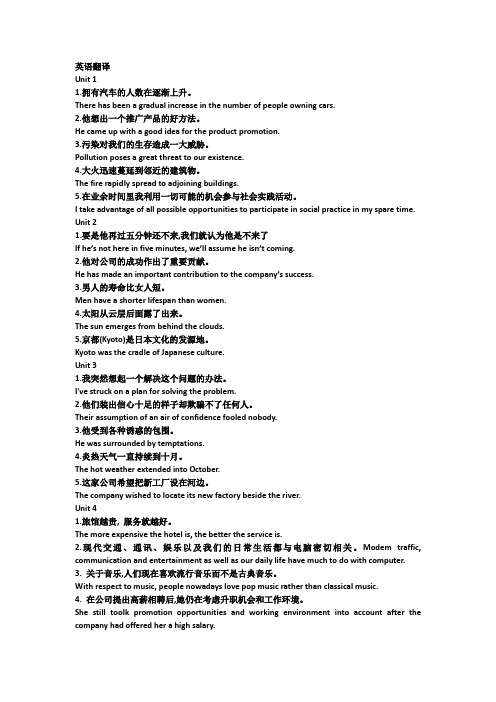
英语翻译Unit 11.拥有汽车的人数在逐渐上升。
There has been a gradual increase in the number of people owning cars.2.他想出一个推广产品的好方法。
He came up with a good idea for the product promotion.3.污染对我们的生存造成一大威胁。
Pollution poses a great threat to our existence.4.大火迅速蔓延到邻近的建筑物。
The fire rapidly spread to adjoining buildings.5.在业余时间里我利用一切可能的机会参与社会实践活动。
I take advantage of all possible opportunities to participate in social practice in my spare time. Unit 21.要是他再过五分钟还不来,我们就认为他是不来了If he’s not here in five minutes, we’ll assume he isn’t coming.2.他对公司的成功作出了重要贡献。
He has made an important contribution to the company’s success.3.男人的寿命比女人短。
Men have a shorter lifespan than women.4.太阳从云层后面露了出来。
The sun emerges from behind the clouds.5.京都(Kyoto)是日本文化的发源地。
Kyoto was the cradle of Japanese culture.Unit 31.我突然想起一个解决这个问题的办法。
I've struck on a plan for solving the problem.2.他们装出信心十足的样子却欺骗不了任何人。
新视野大学英语读写教程2 Unit1 课文翻译

新视野大学英语读写教程2Section A一堂难忘的英语课1 如果我是唯一一个还在纠正小孩英语的家长,那么我儿子也许是对的。
对他而言,我是一个乏味的怪物:一个他不得不听其教诲的父亲,一个还沉湎于语法规则的人,对此我儿子似乎颇为反感。
2 我觉得我是在最近偶遇我以前的一位学生时,才开始对这个问题认真起来的。
这个学生刚从欧洲旅游回来。
我满怀着诚挚期待,问她:“欧洲之行如何?”3 她点了三四下头,绞尽脑汁,苦苦寻找恰当的词语,然后惊呼:“真是,哇!4 没了。
所有希腊文明和罗马建筑的辉煌居然囊括于一个浓缩的、不完整的语句之中!我的学生以“哇!”来表示她的惊叹,我只能以摇头表达比之更强烈的忧虑。
5 关于正确使用英语的能力下降的问题,有许多不同的故事。
学生的确本应该能够区分诸如their / there / they’re 之间的不同,或区别complimentary 跟complementary之间显而易见的差异。
由于这些知识缺陷,他们承受着大部分不该承受的批评和指责,因为舆论认为他们应该学得更好。
6 学生并不笨,他们只是被周围所看到和听到的语言误导了。
举例来说,杂货店的指示牌会把他们引向stationary(静止处),虽然便笺本、相册、和笔记本等真正的stationery (文具用品) 并没有被钉在那儿。
朋友和亲人常宣称They’ve just ate。
实际上,他们应该说They’ve just eaten。
因此,批评学生不合乎情理。
7 对这种缺乏语言功底而引起的负面指责应归咎于我们的学校。
学校应对英语熟练程度制定出更高的标准。
可相反,学校只教零星的语法,高级词汇更是少之又少。
还有就是,学校的年轻教师显然缺乏这些重要的语言结构方面的知识,因为他们过去也没接触过。
学校有责任教会年轻人进行有效的语言沟通,可他们并没把语言的基本框架——准确的语法和恰当的词汇——充分地传授给学生。
8 因为语法对大多数年轻学生而言枯燥且乏味,所以我觉得讲授语法得一步一步、注重技巧地进行。
新视野大学英语读写教程(第二版)第二册课文及翻译
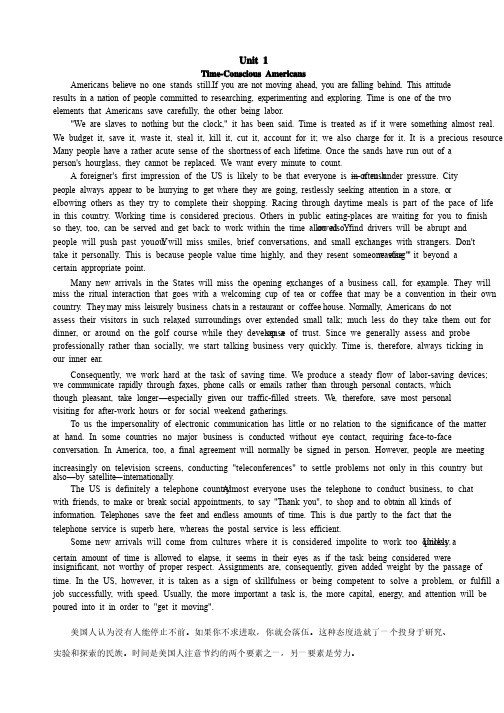
Unit 1Time-Conscious AmericansAmericans Americans believe believe believe no no no one stands still. one stands still. I f If If you you you are are are not not not moving moving moving ahead, ahead, ahead, you you you are are are falling falling falling behind. behind. behind. This This This attitude attitude results results in in in a a a nation nation nation of of of people people people committed committed committed to to to researching, researching, researching, experimenting experimenting experimenting and and and exploring. exploring. exploring. Time Time Time is is is one one one of of of the the the two two elements that Americans save carefully, the other being labor. "We are slaves to nothing but the clock," it has been said. Time is treated as if it were something almost real. We budget it, save it, waste it, steal it, kill it, cut it, account for it; we also charge for it. It is a precious resource Many Many people people people have have have a a a rather rather rather acute acute acute sense sense sense of of of the shortness the shortness of of each each each lifetime. lifetime. lifetime. Once Once Once the the the sands sands sands have have have run run run out out out of of of a a person's hourglass, they cannot be replaced. We want every minute to count. A foreigner's first impression of the US is likely to be that everyone is in a rush —often under pressure. City people people always always always appear appear appear to to to be be be hurrying hurrying hurrying to to to get get get where where where they they they are are are going, going, going, restlessly restlessly restlessly seeking seeking seeking attention attention attention in in in a a a store, store, store, or or elbowing others as they try to complete their shopping. Racing through daytime meals is part of the pace of life in this country. Working time is considered precious. Others in public eating-places are waiting for you to finish so they, too, can be served and get back to work within the time allowed. Y ou also find drivers will be abrupt and people will push past you. Y ou will miss smiles, brief conversations, and small exchanges with strangers. Don't take it personally. This is because people value time highly, and they resent someone else "wasting" it beyond a certain appropriate point. Many new arrivals in the States will miss the opening exchanges of a business call, for example. They will miss the ritual interaction that goes with a welcoming cup of tea or coffee that may be a convention in their own country . They may may miss miss miss leisurely leisurely leisurely business chats business chats in in a a a restaurant restaurant restaurant or coffee or coffee house. house. Normally, Normally, Normally, Americans Americans Americans do do do not not assess their visitors in such relaxed surroundings over extended small talk; much less do they take them out for dinner, or around on the golf course while they develop a sense of trust. Since we generally assess and probe professionally rather than socially, we start talking business very quickly. Time is, therefore, always ticking in our inner ear. Consequently, we work hard at the task of saving time. We produce a steady flow of labor-saving devices; we we communicate communicate communicate rapidly rapidly rapidly through through through faxes, faxes, faxes, phone phone phone calls calls calls or or or emails emails emails rather rather rather than than than through through through personal personal personal contacts, contacts, contacts, which which though though pleasant, pleasant, pleasant, take take take longer longer longer——especially especially given given given our our our traffic-filled traffic-filled streets. streets. W W e, therefore, therefore, save save save most most most personal personal visiting for after-work hours or for social weekend gatherings. To us the impersonality of electronic communication has little or no relation to the significance of the matter at hand. hand. In In In some some some countries countries no major business is conducted conducted without without eye contact, contact, requiring requiring face-to-face conversation. In America, too, a final agreement will normally be signed in person. However, people are meeting increasingly on television screens, conducting "teleconferences" to settle problems not only in this country but also also——by satellite—internationally. The US is definitely a telephone country . Almost everyone uses the telephone to conduct business, to chat with with friends, friends, friends, to to to make make make or or or break break break social social social appointments, appointments, appointments, to to to say say say "Thank "Thank "Thank you", you", you", to to to shop shop shop and and and to to to obtain obtain obtain all all all kinds kinds kinds of of information. information. Telephones Telephones Telephones save save save the the the feet feet feet and and and endless endless endless amounts amounts amounts of of of time. time. time. This This This is is is due due due partly partly partly to to to the the the fact fact fact that that that the the telephone service is superb here, whereas the postal service is less efficient. Some new arrivals will come from cultures where it is considered impolite to work too quickly. Unless a certain certain amount amount amount of of of time time time is is is allowed allowed allowed to to to elapse, elapse, elapse, it it it seems seems seems in in in their their their eyes eyes eyes as as as if if if the the the task task task being being being considered considered considered were were insignificant, not worthy of proper respect. Assignments are, consequently, given added weight by the passage of time. In the US, however, it is taken as a sign of skillfulness or being competent to solve a problem, or fulfill a job successfully, with speed. Usually, the more important a task is, the more capital, energy, and attention will be poured into it in order to "get it moving". 美国人认为没有人能停止不前。
新视野大学英语读写教程2-(第三版)-unit-2-课文原文及翻译

Text A课文 AThe humani ties: Out of date?人文学科:过时了吗?When the goinggets tough, the toughtakeac count ing. When the job market worsen s, manyst udent s calcul ate they can't majorin Englis h orhist ory. They have to studysometh ing that boosts their prospe cts of landin g a job.当形势变得困难时,强者会去选学会计。
当就业市场恶化时,许多学生估算着他们不能再主修英语或历史。
他们得学一些能改善他们就业前景的东西。
The data show that as studen ts have increa singl y should eredthe ever-rising c ost of tuitio n,they have defect ed from the studyof the humani tiesand toward applie d scienc e and "hard"skills that they bet will lead to employ ment. In oth erwords, a colleg e educat ion is more andmor e seen as a meansfor econom ic better mentrather than a meansfor humanbetter ment.This is a trendthat i s likely to persis t and even accele rate.数据显示,随着学生肩负的学费不断增加,他们已从学习人文学科转向他们相信有益于将来就业的应用科学和“硬”技能。
新视野大学英语读写教程2--unit-2-课文原文及翻译
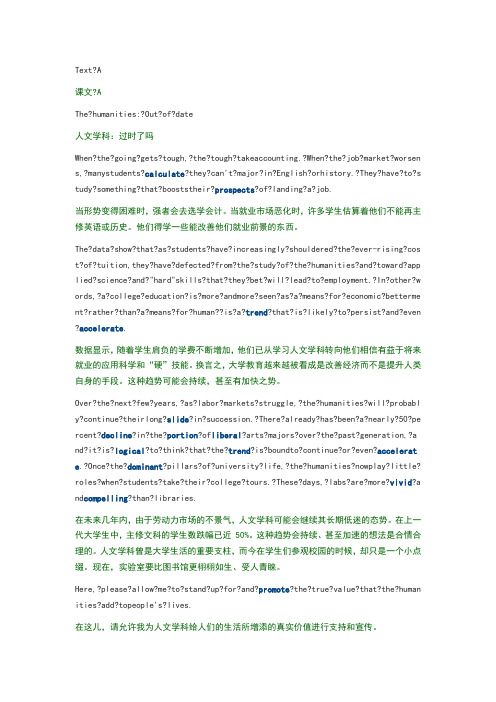
Text?A课文?AThe?humanities:?Out?of?date人文学科:过时了吗When?the?going?gets?tough,?the?tough?takeaccounting.?When?the?job?market?worsen s,?manystudents?calculate?they?can't?major?in?English?orhistory.?They?have?to?s tudy?something?that?booststheir?prospects?of?landing?a?job.当形势变得困难时,强者会去选学会计。
当就业市场恶化时,许多学生估算着他们不能再主修英语或历史。
他们得学一些能改善他们就业前景的东西。
The?data?show?that?as?students?have?increasingly?shouldered?the?ever-rising?cos t?of?tuition,they?have?defected?from?the?study?of?the?humanities?and?toward?app lied?science?and?"hard"skills?that?they?bet?will?lead?to?employment.?In?other?w ords,?a?college?education?is?more?andmore?seen?as?a?means?for?economic?betterme nt?rather?than?a?means?for?human??is?a?trend?that?is?likely?to?persist?and?even accelerate.数据显示,随着学生肩负的学费不断增加,他们已从学习人文学科转向他们相信有益于将来就业的应用科学和“硬”技能。
换言之,大学教育越来越被看成是改善经济而不是提升人类自身的手段。
新视野大学英语读写教程2课后翻译(带答案)
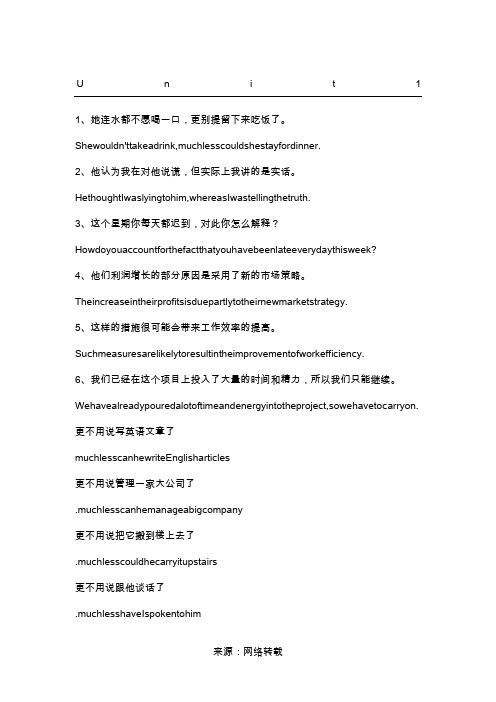
U n i t1 1、她连水都不愿喝一口,更别提留下来吃饭了。
Shewouldn'ttakeadrink,muchlesscouldshestayfordinner.2、他认为我在对他说谎,但实际上我讲的是实话。
更不用说把它搬到楼上去了.muchlesscouldhecarryitupstairs更不用说跟他谈话了.muchlesshaveIspokentohim更不用说大量阅读自己学科以外的东西muchlesstoreadalotoutsideofitUnit2Unit21、尽管她是家里的独生女,她父母也从不溺爱她。
Despitethefactthatsheistheonlychildinherfamily,sheisneverbabiedbyherparentsThisisthefirsttimethathehasmadeaspeechinthepresenceofsolargeanaudience. 我也不觉得有这个必要nordoIthinkitnecessarytodoso他们也不会去我妹妹家norwouldtheygotomysister's我们也没有她的电话号码.nordowehavehertelephonenumber我也不想马上去工作.norwouldIliketogotoworkimmediately我也不会5、我对你的说法的真实性有些保留看法。
Ihavesomereservationsaboutthetruthofyourclaim.6、她长得并不特别高,但是她身材瘦,给人一种个子高的错觉。
Sheisn'tparticularlytall,butherslimfiguregivesanillusionofheight. Unit41、有朋自远方来,不亦乐乎?Itisagreatpleasuretomeetfriendsfromafar.2、不管白猫黑猫,能抓住老鼠就是好猫。
- 1、下载文档前请自行甄别文档内容的完整性,平台不提供额外的编辑、内容补充、找答案等附加服务。
- 2、"仅部分预览"的文档,不可在线预览部分如存在完整性等问题,可反馈申请退款(可完整预览的文档不适用该条件!)。
- 3、如文档侵犯您的权益,请联系客服反馈,我们会尽快为您处理(人工客服工作时间:9:00-18:30)。
新视野大学英语读写教程2——课文翻译Unit1美国人认为没有人能停止不前。
如果你不求进取,你就会落伍。
这种态度造就了一个投身于研究、实验和探索的民族。
时间是美国人注意节约的两个要素之一,另一要素是劳力。
人们一直说:“只有时间才能支配我们。
”人们似乎把时间当作一个差不多是实实在在的东西来对待。
我们安排时间、节约时间、浪费时间、挤抢时间、消磨时间、缩减时间、对时间的利用作出解释;我们还要因付出时间而收取费用。
时间是一种宝贵的资源,许多人都深感人生的短暂。
时光一去不复返。
我们应当让每一分钟都过得有意义。
外国人对美国的第一印象很可能是:每个人都匆匆忙忙──常常处于压力之下。
城里人看上去总是在匆匆地赶往他们要去的地方,在商店里他们焦躁不安地指望店员能马上来为他们服务,或者为了赶快买完东西,用肘来推搡他人。
白天吃饭时人们也都匆匆忙忙,这部分地反映出这个国家的生活节奏。
人们认为工作时间是宝贵的。
在公共用餐场所,人们都等着别人尽快吃完,以便他们也能及时用餐,你还会发现司机开车很鲁莽,人们推搡着在你身边过去。
你会怀念微笑、简短的交谈以及与陌生人的随意闲聊。
不要觉得这是针对你个人的,这是因为人们都非常珍惜时间,而且也不喜欢他人“浪费”时间到不恰当的地步。
许多刚到美国的人会怀念诸如商务拜访等场合开始时的寒暄。
他们也会怀念那种一边喝茶或喝咖啡一边进行的礼节性交流,这也许是他们自己国家的一种习俗。
他们也许还会怀念在饭店或咖啡馆里谈生意时的那种轻松悠闲的交谈。
一般说来,美国人是不会在如此轻松的环境里通过长时间的闲聊来评价他们的客人的,更不用说会在增进相互间信任的过程中带他们出去吃饭,或带他们去打高尔夫球。
既然我们通常是通过工作而不是社交来评估和了解他人,我们就开门见山地谈正事。
因此,时间老是在我们心中滴滴答答地响着。
因此,我们千方百计地节约时间。
我们发明了一系列节省劳力的装置;我们通过发传真、打电话或发电子邮件与他人迅速地进行交流,而不是通过直接接触。
虽然面对面接触令人愉快,但却要花更多的时间,尤其是在马路上交通拥挤的时候。
因此,我们把大多数个人拜访安排在下班以后的时间里或周末的社交聚会上。
就我们而言,电子交流的缺乏人情味与我们手头上事情的重要性之间很少有或完全没有关系。
在有些国家,如果没有目光接触,就做不成大生意,这需要面对面的交谈。
在美国,最后协议通常也需要本人签字。
然而现在人们越来越多地在电视屏幕上见面,开远程会议不仅能解决本国的问题,而且还能通过卫星解决国际问题。
美国无疑是一个电话王国。
unit3我和盖尔计划举行一个不事张扬的婚礼。
在两年的相处中,我们的关系经历了起伏,这是一对情侣在学着相互了解、理解和尊重时常常出现的。
但在这整整两年间,我们坦诚地面对彼此性格中的弱点和优点。
我们之间的种族及文化差异不但增强了我们的关系,还教会了我们要彼此宽容、谅解和开诚布公。
盖尔有时不明白为何我和其他黑人如此关注种族问题,而我感到吃惊的是,她好像忘记了美国社会中种族仇恨种种微妙的表现形式。
对于成为居住在美国、异族通婚的夫妻,我和盖尔对未来没有不切实际的幻想。
相互信任和尊重才是我们俩永不枯竭的力量源泉。
许多夫妻因为错误的理由结了婚,结果在10年、20年或30年后才发觉他们原来是合不来的。
他们在婚前几乎没有花时间去互相了解,他们忽视了严重的性格差异,指望婚姻会自然而然地解决各种问题。
我们希望避免重蹈覆辙。
事实更说明了这一点:已经结婚35年的盖尔的父母正经历着一场充满怨恨、令人痛苦的婚变,这件事给盖尔带来了很大打击,并一度给我们正处于萌芽状态的关系造成了负面影响。
当盖尔把我们计划举办婚礼的消息告诉家人时,她遇到了一些阻力。
她的母亲德博拉过去一直赞成我们的关系,甚至还开过玩笑,问我们打算何时结婚,这样她就可以抱外孙了。
但这次听到我们要结婚的消息时,她没有向我们表示祝贺,反而劝盖尔想清楚自己的决定是否正确。
“这么说我跟他约会没错,但是如果我跟他结婚,就错了。
妈妈,是不是因为他的肤色?”盖尔后来告诉我她曾这样问她母亲。
“首先我必须承认,刚开始时我对异族通婚是有保留意见的,也许你甚至可以把这称为偏见。
但是当我见到马克时,我发现他是一个既讨人喜欢又聪明的年轻人。
任何一个母亲都会因为有这样一个女婿而感到脸上有光的。
所以,这事跟肤色没有关系。
是的,我的朋友们会说闲话。
有些朋友甚至对你所做的事表示震惊。
但他们的生活与我们的不同。
因此你要明白,马克的肤色不是问题。
我最大的担心是你也许跟我当初嫁给你爸爸一样,为了错误的原因而嫁给马克。
当年我和你爸爸相遇时,在我眼中,他可爱、聪明、富有魅力又善解人意。
一切都是那么新鲜、那么令人兴奋。
而且我们两人都认为,我们的婚姻是理想婚姻,至少表面上看是如此,而且一切迹象都表明我们的婚姻会天长地久。
直到后来我才明白,在我们结婚时,我并不十分理解我所爱的人——你的爸爸。
”“但是我和马克呆在一起已有两年多了,”盖尔抱怨道。
“我们俩一起经历了许许多多的事情。
我们彼此多次看到对方最糟糕的一面。
我可以肯定时间只能证明我们是彼此深情相爱的。
”“你也许是对的。
但我还是认为再等一等没坏处。
你才25岁。
”盖尔的父亲戴维——我还未见过他的面——以知事莫若父的态度对待我们的决定。
他问的问题基本上和盖尔母亲的问题相同:“干吗这么匆忙?这个马克是什么人?他是什么公民身份?”当他得知我办公民身份遇到了问题时,就怀疑我是因为想留在美国而娶他女儿的。
“不过爸爸,你这话讲得太难听了,”盖尔说。
“那么干吗要这样着急?”他重复地问。
“马克是有公民身份方面的问题,但他总是在自己处理这些问题,”盖尔辩解道。
“事实上,当我们在讨论结婚的时候,他清楚地表明了一点:如果我对任何事情有怀疑,我完全可以取消我们的计划。
”她父亲开始引用统计数据说明异族通婚的离婚率比同族结婚的要高,而且还列举了接受过他咨询的、在婚姻上有麻烦的异族通婚夫妇的例子。
他问道:“你考虑过你将来的孩子可能会遭受的苦难吗?”“爸爸,你是种族主义者吗?”“不,当然不是。
但你必须得现实一点。
”“也许我们的孩子会遇到一些问题。
但谁的孩子不会呢?可是有一样东西他们将会永远拥有,那就是我们的爱。
”“那是理想主义的想法。
人们对异族通婚生下的孩子是会很残酷的。
”“爸爸,到时候我们自己会操心的。
但是假如我们在做什么事之前,就必须把所有的疑难问题全部解决的话,那么我们几乎什么都干不成了。
”“记住,你什么时候改变主意都不晚。
”几乎每个人都在用电话做生意、与朋友聊天、安排或取消社交约会、表达谢意、购物和获得各种信息。
电话不但能免去走路之劳,而且还能节约大量时间。
其部分原因在于这样一个事实:美国的电话服务是一流的,而邮政服务的效率则差一些。
有些初来美国的人来自文化背景不同的其他国家,在他们的国家,人们认为工作太快是一种失礼。
在他们看来,如果不花一定时间来处理某件事的话,那么这件事就好像是无足轻重的,不值得给予适当的重视。
因此,人们觉得用的时间长会增加所做事情的重要性。
但在美国,能迅速而又成功地解决问题或完成工作则被视为是有水平、有能力的标志。
通常情况下,工作越重要,投入的资金、精力和注意力就越多,其目的是“使工作开展起来”。
unit4大中央车站问询处桌子上方的数字钟显示:差六分六点。
约翰·布兰福德,一个年轻的高个子军官,眼睛盯着大钟,看确切的时间。
六分钟后,他将见到一位在过去13个月里在他生命中占有特殊位置的女人,一位他素未谋面、却通过书信始终给予他力量的女人。
在他自愿参军后不久,他收到了一本这位女子寄来的书。
随书而来的还有一封信,祝他勇敢和平安。
他发现自己很多参军的朋友也收到了这位名叫霍利斯·梅内尔的女子寄来的同样的书。
他们所有的人都从中获得了勇气,也感激她对他们为之战斗的事业的支持,但只有他给梅内尔女士回了信。
在他启程前往海外战场战斗的那天,他收到了她的回信。
站在即将带他进入敌人领地的货船甲板上,他一遍又一遍地读着她的来信。
13个月来,她忠实地给他写信。
即使没有他的回信,她仍然一如既往地写信给他,从未减少过。
在那段艰苦战斗的日子里,她的信鼓励着他,给予他力量。
收到她的信,他就仿佛感到自己能存活下去。
一段时间后,他相信他们彼此相爱,就像是命运让他们走到了一起。
但当他向她索要照片时,她却婉然拒绝。
她解释道:“如果你对我的感情是真实和真诚的,那么我长什么样又有什么关系呢。
假如我很漂亮,我会因为觉得你爱的只是我的美貌而时时困扰,那样的爱会让我厌恶。
假如我相貌平平,那我又会常常害怕你只是出于寂寞和别无他选才给我写信的。
不管是哪种情况,我都会阻止自己去爱你。
当你来纽约见我时,你可以做出自己的决定。
记住,那时候我们两个人都可以自由选择停止或继续下去──如果那是我们的选择……”差一分六点……布兰福德的心怦怦乱跳。
一名年轻女子向他走来,他立刻感到自己与她之间存在着一种联系。
她身材修长而苗条,漂亮的金色长发卷曲在小巧的耳后。
她的眼睛如蓝色的花朵,双唇间有着一种温柔的坚毅。
她身穿别致的绿色套装,犹如春天般生气盎然。
他向她迎去,完全忘记了她并没有佩戴玫瑰。
看他走来,她的嘴角露出一丝热情的微笑。
“当兵的,跟我同路?”她问道。
他不由自主地向她靠近了一步。
然后,他看见了霍利斯·梅内尔。
她就站在那少女的身后,一位四十好几的女人,头发斑斑灰白。
在年轻的他的眼里,梅内尔简直就是一块活脱脱的化石。
她不是一般的胖,粗笨的双腿移动时摇摇晃晃。
但她棕色的外衣上戴着一朵红色的玫瑰。
绿衣少女快速地走过,很快消失在了雾中。
布兰福德觉得自己的心好像被压缩成一个小水泥球,他多想跟着那女孩,但又深深地向往那位以心灵真诚地陪伴他、带给他温暖的女人;而她正站在那里。
现在他可以看见,她苍白而肥胖的脸上透着和善与智慧。
她灰色的眼中闪烁着温暖和善良。
布兰福德克制住跟随年轻女子而去的冲动,尽管这样做并不容易。
他的手抓着那本在他去战场前她寄给他的书,为的是让霍利斯·梅内尔认出他。
这不会成为爱情,但将成为一样珍贵的东西,一样可能比爱情更不寻常的东西──一份他一直感激、也将继续感激的友情。
他向那个女人举起书。
“我是约翰·布兰福德,你──你就是霍利斯·梅内尔吧。
我非常高兴你能来见我。
我能请你吃晚餐么?”那女人微笑着。
“我不知道这到底是怎么回事,孩子,”她答道:“那位穿绿色套装的年轻女士──刚走过去的那位──请求我把这朵玫瑰别在衣服上。
她说如果你邀请我和你一起出去,我就告诉你她在公路附近的那家大餐厅等你。
她说这是一种考验。
”unit5我女儿抽烟。
她做作业时,脚搁在前面的长凳上,计算器嗒嗒地跳出几何题的答案。
我看着那包已抽了一半、她随意扔在手边的“骆驼”牌香烟。
我拿起香烟,走到厨房里去仔细察看,那里的光线好一点──谢天谢地,香烟是有过滤嘴的。
